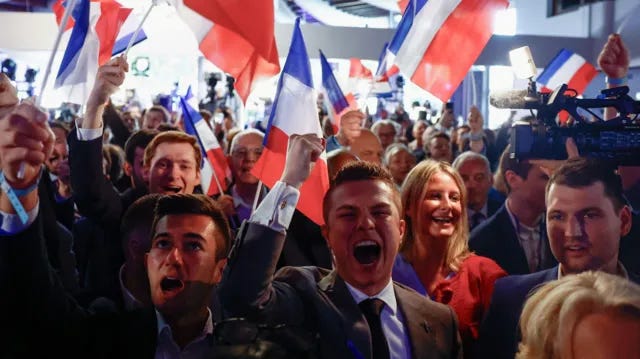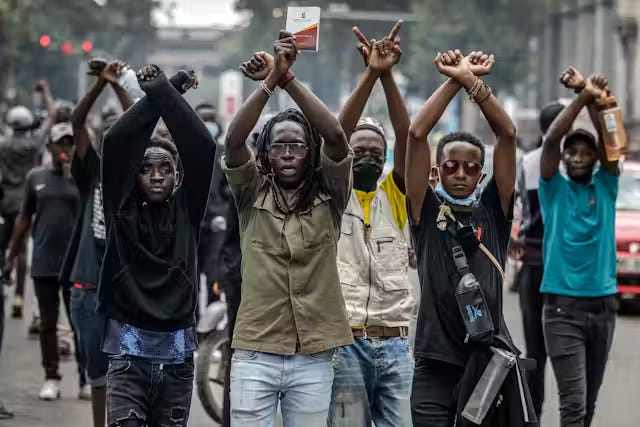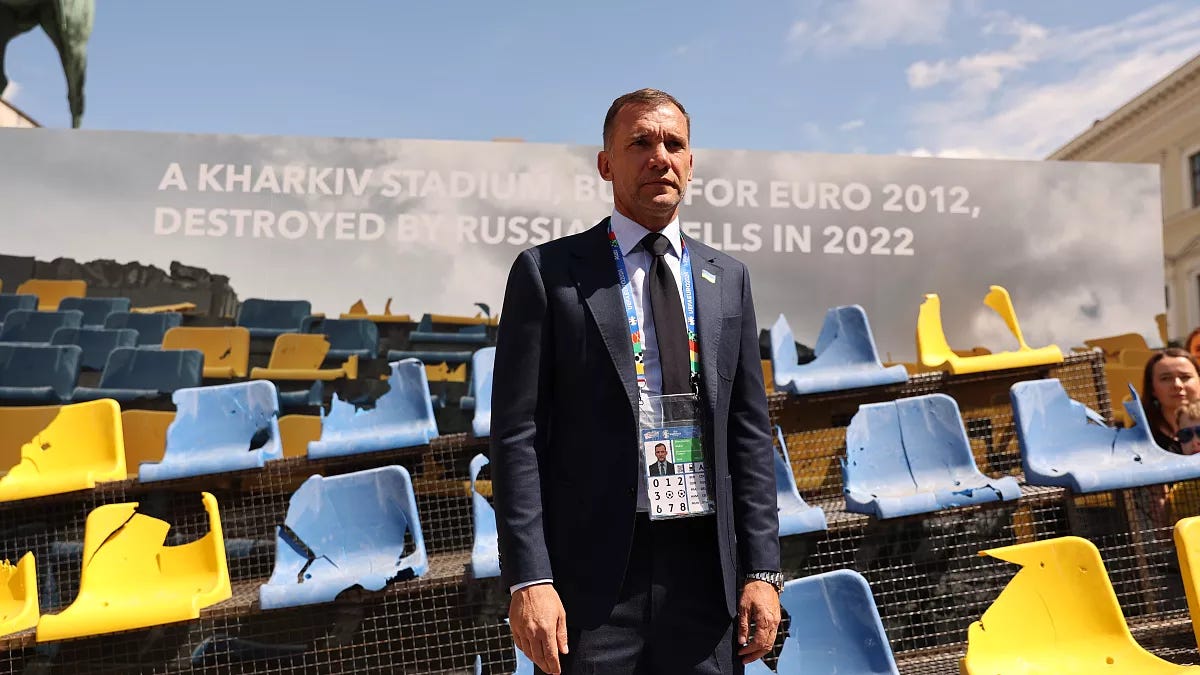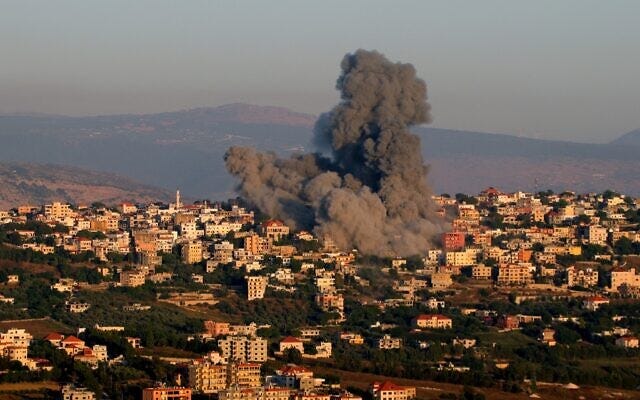June 2024 Roundup: France and Mexico elections and Kenya protests
A month of elections and wars
Good Morning, Afternoon, and Evening wherever you are,
I hope everyone is enjoying or enjoyed June, and the start of summer vacation. This month has been a busy one for me as I was preparing to Graduate after 5 years in university. It’s been a long journey but I finally get my bachelors degree! While I’m still planning on what to do in the future, for now, I’m just going to enjoy celebrating this big milestone.
At the same time, those who live outside of Edmonton or even Canada might be seeing Edmonton in the news a lot in the last few weeks. Reason being, the Edmonton Oilers, the hockey team that had Wayne Gretzky and dominated the 1980s with winning 5 stanley cups, were in this years stanley cup finals playing against the Florida Panthers. Sadly, they were not able to win it even though they made a comeback three games down to tie the series only to lose game 7. Many Canadians were on the bandwagon so they can see the team break the curse and finally bring the cup back to the home of the sport.
As you guys know, I am a supporter of the Toronto Maple Leafs (that team that hasn’t won the cup since 1967), however I find myself a lot of times supporting the Oilers given that I have lived in Northern Alberta for a long time and this team has be through the highs and lows as well has having a gritty and hardworking character.
Anyways enough of that let’s get to the news.
#5: EU elections+Macron surprise snap election
The EU elections that took place on June caused a political earthquake in the continent as right wing parties from the blocs, Identity and Democracy (ID), and the European Conservatives and Reformists, (ECR), made huge gains in the elections. While the centre, centre right, and centre left blocs remain the largest blocs after the elections they see their numbers reduced which could hamper the EU’s agenda on climate change, immigration and support for Ukraine.
Most of the gains for the right wing parties came in Germany and France, the EU’s two largest member countries. In Germany, the far right Alternative for Deutschland (AFD) came in second place with the most Members for the European parliament (MEPS) with 15 seats as governing party in Germany, the Social Democrats and their partners, the Greens saw huge losses that night. Another victory for the AFD came in terms of gains with young voters where they received the second most votes from that demographic right after the conservative CDU party and well ahead of the Social Democrats.
The party won every state in the Eastern and former communist half of the country. The party had been in controversy earlier in March when reports came out that MPs of the party had met with members linked to Neo Nazi groups who discussed about “mass deportations” leading to millions of Germans coming out to protest. However, that has not dissuaded voters from voting for the party as they have been attracted by the party’s policy on immigration, economy, energy and policy over the Russian invasion of Ukraine.
In France, the political earthquake was much greater with the far right, National Rally (RN) party led by Marine Le Pen winning the most seats in the election as French President Emmanuel Macron’s party suffered a humiliating defeat. On the same night as the results were announced, Macron announced a surprise snap legislative elections, in an address to the nation, he pleaded to French citizens to prevent the Far right from coming into power in 2027, the year of the next presidential election.
Cue the mayhem that happens the next few days as parties prepare for an election they were never prepared for. The National Rally leaders Le Pen, and the man vying to be the next and youngest prime minister, 28 years old, Jordan Bardella, welcomed Macron’s challenge, meanwhile further to the right of RN, the Reconquete party led by former political commentator, Eric Zemmour and who’s spokeswoman happens to be the niece of Marine Le Pen, Marcal Le Pen, have given signals that it is willing to work with RN, although when it was first announced by Marcal Le Pen, Zemmour had a surprise reaction.
The Republicans party which had once been a bastion of French conservatism most famous presidents such as Jacques Chirac and Nicolas Sarkozy, had become a shadow of its former self as the party’s decline was symbolized with the leader of the party, Eric Ciotti, claiming that he would work with the RN party, which angered members, leading to Ciotti locking the doors of the party’s headquarters (the doors were later unlocked).
Meanwhile after years of bickering parties on the left decided to unite and form an alliance that ranges from the centre left, socialist party, to the left wing party of Jean Luc Melenchon and the French Communist Party three days after Macron’s election call. Since the election call, it seems that the gamble has backfired with polls showing Macron’s party being battered by both the National Rally and the Left-wing alliance.
Some members of France’s national football team who are playing in the Euros, such as captain and superstar, Kylian Mbappe, Ousmane Dembele and Marcus Thuram, have also joined in the debate urging young voters to prevent the far right from coming into power demands which angered Bardella and Le Pen.
If Macron’s party is as predicted going to lose this election, it will be much harder to pass the reforms he want to do in the country. His reforms have angered both the left and right over various issues such as pension reforms and reforms on the environment which have angered many including farmers. This years olympics won’t do much to help Macron with many Parisians not having as much enthusiasm as their politicians, with a call for them poop in the Seine river to protest the high levels of bacteria from the sewage in the river (you read that right…).
The first round of the elections start on June 30th, with the second round of voting taking place on July 7th.
UPDATE: The National Rally is in reach of becoming the most dominant party after the first round of voting. They won 34%, while the left wing coalition comes in second with 28%, and Macron’s party won 21%.
#4: Mexico Elections
Mexico elected it’s first female and Jewish president on June 2nd. Claudia Sheinbaum, the former head of the Mexico City government and member of the governing Morena party beat out her main opponent, Xóchitl Gálvez by a margin of 61% to 28%. Prior to coming into politics, Sheinbaum was a climate scientist who had a role in contributing to reports to the UN’s body on climate change, the IPCC.
She has been in a player in Mexican politics specifically in Mexico City where she took on the role of leading the efforts of the city to fight climate change. She has been described by the Associated Press (AP) as being a “lifelong leftist” as she has remained a close ally to Mexico’s current president, Andres Manuel Lopez Obrador, known by his nickname, AMLO, who has been seen as a mentor to her.
That link between her mentor however has been used by the opposition to paint Shienbaum as being the same as AMLO, with even some calling her a puppet to him. Since coming into power in 2018, AMLO has been accused by both opposition groups, pundits, and other figures of moving the country to a more authoritarian route, with controversial reforms of the supreme court which would see judges voted in by popular vote, spreading misinformation and attacking the press, and the Ministry of Defence’s use of the Pegasus spyware which had targeted and infiltrated the cell phones of human rights activists and members of government according to Freedom House.
While she has committed to proceed with judicial reforms along with the economic and social welfare reforms under her predecessor, analysts of Mexican politics say that there have been times where she has differed from AMLO, for example, during the COVID-19 pandemic, Sheinbaum was a supporter of increased testing and restrictions on business hours and capacity, along with masking and social distancing. By contrast, AMLO was less enthusiastic of such measures in fear of that they would hurt the economy. Analyst view her background in science as being critical for putting in such measures.
With that being said most Mexicans will have to wait and see for what Sheinbaum will do in power once she is inaugurated on October 1st of this year. Despite an improving economy, Sheinbaum will have to deal with issues ranging from the high rates of violence, more specifically femicide which Mexico is ranked as among the highest in the world, handling the relationship with the US on issues related on trade and the crisis on the US-Mexico border, and the role of drug cartels in the fentanyl and opioid crisis on both sides of the border.
Some early moves in terms of who she is putting in her abinet has provided relief for markets as she has named familiar faces to the cabinet such as Mexico's former foreign affairs minister, Marcelo Ebrard as finance minister, a move seen to help the country to deal with its relationship with the US.
#3: Kenya Protests
Kenya has been gripped in protests after the government introduced a bill which would see tax hikes that would raise over 2.7 billion dollars which was required for the IMF’s loan agreement. The bill included levies on imported goods, hospital goods, and food. For many of the protestors the protest is more than just tax hikes as they are about frustration over corruption and incompetence in the government for many years.
The protests turned violent when protesters entered the Kenyan parliamentary buildings which led to Kenyan security forces shooting at the protestors. 26 people have been reported to have been killed.
Kenya’s president, William Ruto, whose been in power for two years, withdrew the bill on June 27th after the crackdown on protestors, however, protestors are not backing down as they are calling for Ruto to resign as they see him as a part of the old leadership that has ruled for decades. Since gaining independence from Britain in 1963, there have been a few politicians who have had a stronghold in terms of support in the country. One of those few politicians included Ruto himself, along with Uhuru Kenyatta, Ruto’s predecessor and the son of Kenya’s first president, and Raila Odinga, who had been prime minister under Kenyatta’s rule. They have also succeeded in terms of their through addressing the grievances of the many ethnic groups of the country.
Since coming into power in 2022, Ruto has had to deal with the effects of the Russian Invasion of Ukraine which has seen prices for food and energy go up. Ruto announced to subsidise certaining goods, that has however seen the country’s deficit and debt grow since then. Like many other central banks, the Kenyan has had to increase interest rates last year leading it to turn to the IMF for help, whose loans contain conditions such as balancing the budget through austerity measures. This led to the subsidies being scrapped which led to protests. The IMF defends its approach saying austerity measures were the only way of balancing the books quickly and highlight that the alternative to that would be countries facing bankruptcy.
There has not been a particular face leading the protesters as it has mostly been young people across the country using social media to help with their cause. This has ranged from explaining the bill in their many languages that Kenyans speak and even using AI as well to help do the job, along with using crowdfunding sites to help with transportation of protestors from other areas into Nairobi. However, Ruto’s administration has been trying to shutdown the internet in the country to stop the protestors.
#2: Ukraine Update
On the Battlefield
The Russian army continues its attacks in several regions more prominently the regions of Kharkiv and Donetsk. Where the Russian army has continued to make efforts in expanding territory. One of the attacks in Kharkiv killed three people along with 52 people injured on June 23rd. Reports have come in that the Russian army had entered a district of Chasiv Yar, a city in Eastern Ukraine, however the Ukrainian military says that they were pushed back by the Ukrainian army on June 28th .
Russian rocket attacks were experienced in cities such as Kyiv, Kharkiv, Kryvyi Rih, Dnipro, while officials in the Russian occupied regions of Donetsk, Luhansk, Kherson and Crimea says that Ukrainians have also striked rockets in their areas. The Russian region of Belgorod continues to face attacks with the region’s officials saying that the drone attacks and shelling were the responsibility of Ukrainian forces.
The Ukrainian army continues it’s attacks on military infrastructure in both Russia and in occupied territories. According the ISW, Ukraine has used American made weapons to target air defence systems in Russia. On June 23rd, Russia accused the Ukrainians of a missle attack that hit a beach which killed four people and injured 150 others. Media outlets cannot verify where the weapon has came from due to lack of access to the region.
Ukraine has been given permission by the US along with other European countries such as France, to use weapons supplied by them to hit targets on Russian territory, but exclusively for the defence of Kharkiv. According to Politico, Ukrainian officials asked for the request after Russia started its offensive on Kharkiv.
Plans for Ukrainian pilots to operate the F-16 fighter jets are expected at some point in the summer according to a Dutch air force commander, Arnoud Stallman. Belgium, Denmark and Norway have pledged to provide 80 of these jets, but have been dealing with delays in delivery and training. According to Ukrainian air force’s head of aviation, Serhii Holubtsov, the Ukrainians may keep some of the jets on foreign bases to prevent them from being hit by the Russian strikes. French President, Emmanuel Macron promises to send Mirage fighter jets to Ukraine as well.
Off the Battlefield
A Peace summit was held in Switzerland with the leaders and foreign ministers of 92 countries participating in the event. Ukrainian President, Volodymyr Zelensky attended the summit along with US vice president, Kamala Harris. No representatives from Russia or China participated. The summit focused on a wide range of issues on a framework for a peace deal, food security, nuclear safety and humanitarian issues regarding civilian and prisoner exchange. The framework was agreed on by the US, Canada, and all European countries, and a number of countries from South America, Asia and Africa. However, Brazil, India, Saudi Arabia, Mexico and South Africa were among the few countries that did not sign on to the framework citing the absence of Russia or the participation of Israel at the summit.
Russian president, Vladimir Putin had presented a peace proposal which would see Ukrainian troops completely withdraw from the territories of Donetsk, Luhansk, Zaporizhia, and Kherson along with abandoning plans to join NATO. The plans were condemned by the US and Ukraine. US national security advisor, Jake Sullivan, called the plans unreasonable.
Switzerland was among the number of places which Zelensky visited as he also participated at the 80th anniversary of the D-Day landings in France, along with addressing the German parliament where members of the AFD and the left wing party of Sahra Wagenknecht (BSW) did not attend.
South Korea is considering arming Ukraine after Russia and North Korea signed a strategic pact to support each other in case of a war. This has angered the administration Yoon Suk Yeol, who has called the pact a threat to his country and that it has a negative consequence to the country’s relationship with Russia.
The US has lifted a ban on providing weapons and training to the Azov Battalion. A brigade which has been controversial due to its association with far-right and neo nazi groups and were involved in the fighting over the Ukrainian defence of the city of Mariupol. A US spokesman for the state department says they have found “no evidence of gross violations of human rights".
In an interview with the Guardian, Zelensky said that Donald Trump risks being a “loser president” if he imposes a bad peace deal on Ukraine if he becomes president. He continued that it would mean the of the US as a global player. Zelensky has also said he has no strategy yet for dealing with the Trump administration and that former British Prime Minister, Boris Johnson has approached him on his behalf.
#1: Israel-Gaza War update
On the Battlefield
As Israeli continues to its war in Gaza, the focus of attention has been on the situation on Israel’s northern border with Lebanon where the IDF and Hezbollah have continued to exchange attacks with each other. June saw an intensity in terms of the attacks as fears grow from Israel’s allies that it could extend the conflict into Lebanon. US officials have been pressuring Israel to avert from such actions. Israel has demanded that it wants Hezbollah to withdraw a few kilometres back from the border, following the UN security council resolution that was agreed one after the 2006 war in Lebanon.
On June 8th 2024, four hostages were rescued after IDF forces raided the Nuseirat Refugee Camp. Noa Argamani, Almog Meir Jan, Andrei Kozlov and Shlomi Ziv were the hostages who were rescued all four were attendees at the Nova Music Festival which was attacked on October 7th of last year. While many world leaders expressed congratulations and relief for the hostages release, the amount of people killed in the rescue operation along with how it was conducted has come into question. As the EU’s top diplomat, Josep Borrell condemned in the “strongest terms regarding the reports of another massacre of civilians”.
An armed division of Hamas has also claimed that 3 hostages died in the raid including a US citizen.
The United Nations Relief and Works Agency for Palestine Refugees (Unrwa) has warned that disease is spreading across the Gaza strip as problems with sewage and rubbish grows along with hot temperatures and lack of clean water. Doctors believe an outbreak of disease such as cholera is likely and that cases of Hepatitis A are rising.
A video verified by Reuters which was circulating on on social media in the past few weeks shows Israeli army forces strapped a wounded Palestinian man to the hood of a military jeep in the city of Jenin located in the West Bank. The video shows the jeep passing by two ambulances. Prior to the video, The IDF said the actions were “unacceptable”.
Off the Battlefield
A day after the rescue operation, Benny Gantz, a minister in the Israeli war cabinet and prior to October 7th,the main opposition leader, resigned from his post in the cabinet. Gantz was planning to resign earlier but due to the rescue operation, announced his resignation 24 hours after the operation. Gantz had said he would quit the cabinet if they did not accept his six point plan. A few days later Israeli Prime Minister, Benjamin Netanyahu would dissolve the war cabinet in what some viewed as a rebuff towards his far right ministers, however, analysts view both Gantz resignation and the war cabinet dissolution as not having to much of an impact in terms of the decision-making regarding the war.
Israeli Prime Minister, Benjamin Netanyahu has accused the US of withholding weapons even as the White House has denied the claims. He has claimed that for four months these weapons have been withheld without mentioning which weapons are being withheld.
Even as Israeli Prime Minister has criticized moves made by the Biden administration, He has accepted an invitation to address a joint meeting of Congress by the top 4 congressional leaders of the house and senate. A move that has been met with criticism of the move from both lawmakers and activists.
Iran’s UN mission has warned on X (formerly Twitter) that if Israel launches a “full scale military aggression” in Lebanon “an obliterating war will ensue.”
The Israeli government has reaffirmed that the IDF is “committed to the destruction of Hamas, as an IDF spokesperson who said that Hamas is an “ideology” that cannot be eliminated.
The Israeli supreme court ends draft exemptions to the IDF for Orthodox Jews. The decision comes as Israeli forces are fighting wars in Both Gaza and it’s norther border with Lebanon. The court said “At the height of a difficult war, the burden of inequality is more than ever acute.” The move could divide Netanyahu’s governing coalition as he is reliant on the votes of Orthodox Jews. Most Jewish Israelis have to serve for the IDF after they turn 18, three years for men and two years for women, however some groups are exempt from it such as Arab Israelis and Ultra Orthodox Jewish seminary students.
Israel’s Finance minister, Bezalel Smotrich, has restated his position that the Israeli occupied West Bank should permanently be a part of Israel saying “My life’s mission is to thwart establishment of Palestinian state”. Smotrich along with national security minister, Itamar Ben-Gvir are considered to be on the far-right of Israeli politics.









